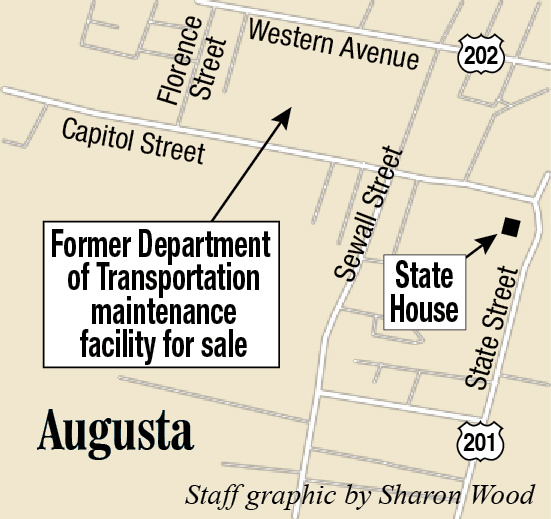AUGUSTA — A Yarmouth hotelier, campaign contributor and political ally of Gov. Paul LePage appears well-positioned to develop and lease a 225,000-square-foot facility that would become the new home of several state agencies.
Peter Anastos secured a purchase option in April on a 9-acre state-owned property formerly used by the Maine Department of Transportation for vehicle maintenance. The property, located on Capitol Street, satisfies two key requirements in the state’s request for proposals. First, it falls within a 1-mile radius of the State House, a requirement established in the RFP. Second, the property could also satisfy the requirement of 1,300 parking spaces — nearly twice the number required by city ordinance — which would be utilized by the estimated 1,400 state employees expected to be relocated by the project.
“When you draw that one-mile arc (from the State House), the potential sites aren’t just limited, they are in some respects almost exclusive,” said Keith Luke, deputy director for development services for the city of Augusta. “This was drawn up almost exclusively so that Peter Anastos and that specific former MDOT property is the only location that would meet (the requirements of the proposal), as specified.”
Luke said that several other properties meet the distance requirement, including state-owned property and a former hospital on the eastern side of the Kennebec River, but it’s unlikely the other properties can meet the parking specifications outlined in the state RFP.
“There are a number of ways that you can deck-up parking,” he said. “But we are talking about a development plan with a footprint with the size of the Capitol Mall.”
Kevin Mattson, developer of the Central Maine Commerce Center in Augusta, said the specifications of the RFP do seem to “significantly limit the possibilities.” Other potential sites in the city, such as the Ballard Center in the former MaineGeneral hospital building, would only be about half of the needed size, with about 700 available parking spaces.
Mattson said a big development such as the proposed large state office complex probably would have a “gravitational pull” that draws more development around it and requires traffic pattern changes.
“It’s going to have a significant impact on the area around it, in a good way,” he said.
Anastos’ potential involvement has raised questions about a project that city officials have long worried will adversely affect the local tax rolls or make vacant key downtown properties currently leased by the state. Those and other concerns were brought forward earlier this year after the governor included a $112 million bond proposal in his two-year budget plan to move state workers from currently leased space at several city locations to renovated or yet-to-be-built state-owned property. The Legislature, the final arbiter of state capital improvement projects, scaled back the governor’s proposal to $23.9 million when it passed the state’s two-year budget in June.
Anastos owns Maine Course Hospitality Group, a company that develops and operates hotels throughout Maine. He was appointed by LePage to the Maine State Housing Authority and, along with former state treasurer Bruce Poliquin, now a congressman, led a highly politicized effort to oust the agency’s former director, Dale McCormick. Anastos has also donated to several Republican candidates, including $3,750 to LePage’s 2010 and 2014 campaigns for governor.
A spokesman for the Department of Financial and Administrative Services, the state agency that issued the RFP, said the agency was unaware that Anastos planned to bid on the state lease project.
“Really, in terms of what qualifies and what doesn’t, it’s really determined based on what we get for submissions from bidders,” said David Heidrich, a DAFS spokesman. “As long as the submissions that we receive meet the requirements of the RFP they will absolutely be considered. The RFP panel will score each proposal accordingly.”
He added, “Just because we put out an RFP doesn’t mean that we’ll be issuing an award to any of the bidders. We need to make sure that it gives the best economic benefit to the state and makes the most sense to the state agencies that will be occupying the building, as well the constituencies that they’ll be serving.”
Anastos secured the purchase option on the Capitol Street property from the Maine Department of Transportation in April after Auburn developer George Schott let his purchase option expire. Schott had originally planned to build a hotel on the property.
In an email, Anastos said that he did not envision a hotel on Capitol Street when he obtained the rights in April. “I simply thought that the location was a great place for an office campus for possibly state and private sector offices,” he said. “I thought it would be very attractive gateway to the capitol and efficient for those who do business with the state. I thought also it would be a huge improvement for the capitol over the garages and such that existed there.”
He said that he contacted “everyone we could think of” in state government, including the LePage administration upon gaining rights to the property, but the state told him to seek private sector tenant. Anastos said the state never had any interest in a state office development until an agency within DAFS contacted his broker in June.
Sen. Roger Katz, R-Augusta, said he wasn’t sure if the proposal would require any additional votes by the Legislature. However, he said he hoped the LePage administration and DAFS would brief the Legislature’s budget writing committee on the proposal. Katz, a member of the budget committee, said the development has “major implications for the city and could change the landscape, literally and figuratively.”
Luke said that the city planning board will likely have to ratify the project. However, if the project meets the specification of zoning ordinances, the city won’t be able to stop it. Among its biggest concerns, he said, is that the development will prompt the Center for Disease Control to move from its current location at Key Bank on Water Street. CDC is one agency within the Department of Health and Human Services. The governor’s original office plan would have consolidated DHHS offices around the city to one location.
Heidrich said that it’s not yet known which agencies will move into the new development if it moves forward.
Staff writer Keith Edwards contributed to this report.
Send questions/comments to the editors.










Success. Please wait for the page to reload. If the page does not reload within 5 seconds, please refresh the page.
Enter your email and password to access comments.
Hi, to comment on stories you must . This profile is in addition to your subscription and website login.
Already have a commenting profile? .
Invalid username/password.
Please check your email to confirm and complete your registration.
Only subscribers are eligible to post comments. Please subscribe or login first for digital access. Here’s why.
Use the form below to reset your password. When you've submitted your account email, we will send an email with a reset code.